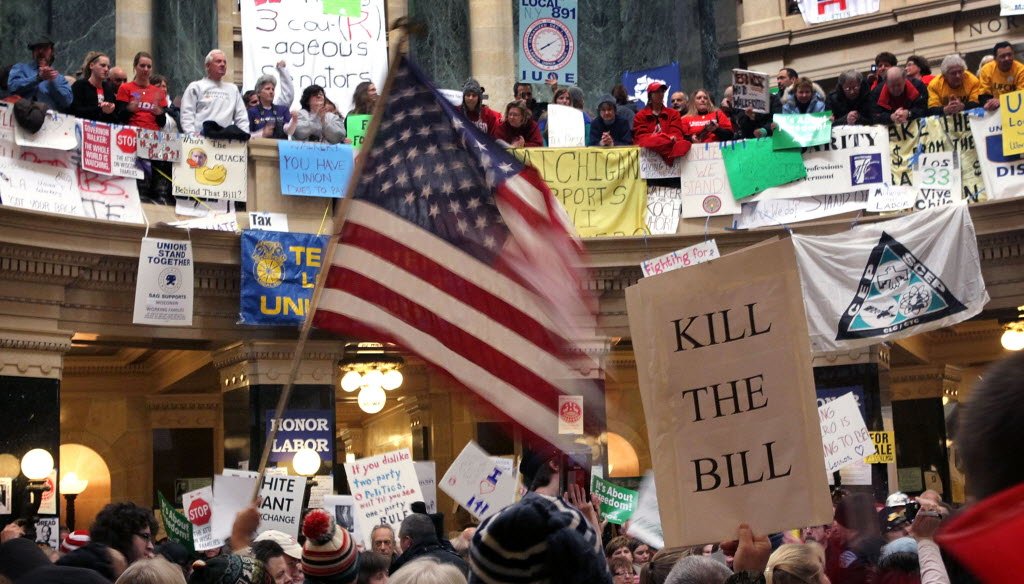Get PolitiFact in your inbox.

Protestors demonstrated inside the Wisconsin Capitol on Feb. 26, 2011, in a failed effort to stop a bill that sharply curtailed collective bargaining powers of many state and local public employees.
Gov. Scott Walker’s move to sharply curtail the collective bargaining power of public employees spurred massive protests and an unprecedented recall election.
Adopted into law in 2011, Act 10 affects most state, county, municipal and school employees in Wisconsin.
Notably exempted were police and firefighters.
Then in late July 2013, Walker seemed to open the door to applying Act 10 to them as well.
But the next day, the governor seemed to walk back his comments.
To clarify what Walker said, we turn to In Context, an occasional PolitiFact Wisconsin feature that aims to add context to statements that get widespread attention.
So, here’s what Walker said one day, and how he clarified his remarks the next.
First-day remarks
Walker spoke July 29, 2013, in Milwaukee at the annual meeting of the Government Research Association. It’s a national organization of professionals, typically employed by non-profits, who do non-partisan research on government.
Walker’s comments about Act 10 came in response to a question from a member of the audience.
Question: "Is there any chance in the future that Act 10 might get extended also to police and fire?"
Walker: "Yeah, I think that’s a possibility, although it’s been interesting by jurisdiction. Some jurisdictions have seen -- some have, some haven’t -- have seen movement even with the fire and police being under collective bargaining, some movement that way because of that very pressure and because of pressures from other municipal employees.
"So, it has had some positive impact in that regard. It will be interesting going forward. There are some voices in the Legislature talking about that."
Walker then made other comments related to Act 10 before finishing his answer by saying:
"But I think now for those areas, having seen that the world didn't come to an end for other municipal employees and county employees, there might be a greater opening going forward because they'd say, 'Hey, you know, things worked out’ ….So, I think there’ll be some openness out there."
Second-day remarks
The next day, Walker spoke in response to a reporter’s question.
Reporter: "Yesterday, you said about Act 10 you might want to make it apply to firefighters and to police. Have you talked to the unions or the union leaders?
Walker: "Haven’t talked to them. Just so it’s clear, I made an observation for a question that was asked about -- one of the participants in the session I was at yesterday when I took questions asked if it would ever be possible. And I talked more as an observer, more as an observation, than I did as a statement.
"I said I’m not pursuing it, but it’s one of those where I think in the future there’s a possibility, at least, that that could be included in the discussions, mainly because I think a lot of the people that predicted more negative outcomes in terms of what it meant for public employees and other areas, that just didn’t materialize and it’s been good for the public employees at both the state and the local level.
"There isn’t a specific proposal I’m pushing and I don’t know of anything right now in the state Legislature, but it could potentially, I suppose."
Our Sources
Milwaukee Journal Sentinel, "Scott Walker opens door -- then downplays -- limiting public safety unions," July 30, 2013
Wisconsin Eye, video (at 2:20:20) of Gov. Scott Walker speech, July 29, 2013
Reporter’s audio of Gov. Scott Walker question-and-answer session with reporters, July 30, 2013




















